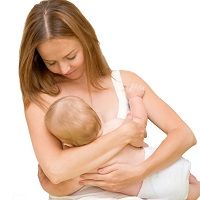Article
Exclusive Breastfeeding Reduced Odds of Ongoing Eczema At 6 Years
Author(s):
Compared to a short time of breastfeeding or none, children exclusively breastfed for ≥3 months were less likely to have continued eczema at 6 years old.

While the duration of exclusive breastfeeding of an infant was not found to be related to the likelihood of an eczema diagnosis, a new study found that exclusive breastfeeding of at least 3 months was associated with a significantly lower chance of continued eczema when the child was 6 years old.
“Exclusive breastfeeding may not prevent eczema or eczema diagnosis, but may play a protective role in decreasing the chronicity of eczema in childhood,” wrote Katherine M. Balas, BS, BA, Children's National Health Systems, Washington, DC, with colleagues Karen A. Robbins, MD, Marni Jacobs, PhD, Ashley Ramos, PhD, Daniel V. DiGiacomo, MD, and Linda Herbert, PhD.
The research, which was presented at the 2019 Annual Meeting of the American Academy of Allergy, Asthma & Immunology (AAAAI), drew upon survey data from the Infant Feeding Practices Study II and its accompanying Year 6 Follow-Up.
The study used information about breastfeeding for 1520 infants, as well as data about eczema symptoms at 6 years of age and whether they had ever had a diagnosis of eczema. Of the participants, 309 children (20.33%) had at some point had a diagnosis of eczema. Among children who had had a previous diagnosis of eczema, 58.58% (n = 181) had eczema as 6-year-olds.
The research team found that higher socioeconomic status, defined as family income of at least 185% of the federal poverty level, as well as a family history of food allergies were both significantly associated with greater odds of ever having eczema as well as eczema at the 6-year follow-up.
The study’s primary finding was that exclusive breastfeeding for at least 3 months resulted in significantly lower odds of continued eczema when the child was 6 years old (aOR = 0.477 [95% Confidence Interval 0.259, 0.878], P = .017).
“There are a lot of factors that may impact a child’s likelihood of developing eczema,” said Balas, the study’s first author, in a press release. “Socioeconomic status and family history of food allergies certainly plays a role. But this research is telling us that by breastfeeding an infant for more than 2 months, the likelihood of eczema persisting later into childhood drops significantly.”
Due to the influence of sociodemographic variables and familial history of allergic disease on the likelihood of developing eczema, the research team used multivariable logistic regression models to control for these factors.
“Our next steps should explore how the mother’s diet while breastfeeding comes into play,” said Balas. She also raised the question of whether the protective effects of long-term breastfeeding against eczema would continue into adolescence and adulthood.
The abstract, “Exclusive breastfeeding in infancy and eczema diagnosis at 6 years of age,” was presented at the Annual Meeting of AAAAI on Saturday, February 23, 2019.





